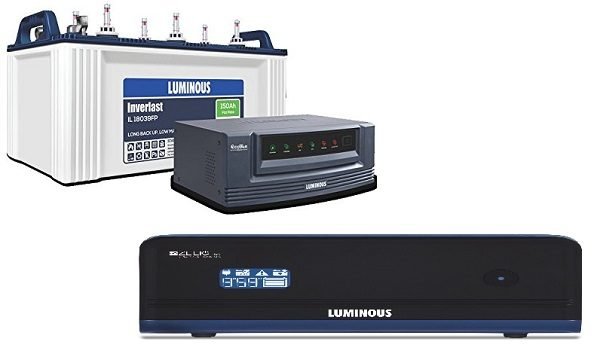It’s annoying when the power goes out all of a sudden, and you lose work. While power cuts have reduced, having a UPS or Inverter is still a good idea. I am writing this post for those who are confused about buying a UPS or Inverter for their computer and electric devices. These devices are time-sensitive, and there should not be more than 3-4 milliseconds difference when switching power otherwise, they will shut down. In this post, I will share the differences between UPS and Inverters.

What is a UPS?
UPS or Uninterruptible Power Supply unit continues to supply power to the connected device when there is a power cut. UPS have the fastest or close to zero switching time since they continuously run on the battery power and charge the battery simultaneously. This arrangement makes sure that the connected devices don’t shut down when the power goes out.
What is an Inverter?
Inverters are meant to power household appliances like fans and lights. They run directly on mains power till there’s a power cut and then switch to battery power in a few microseconds, which is more than the UPS switching time.
Difference between UPS & Inverter
We are not going into the internal working mechanism of these devices but only touching upon the factors that may interest the end-user.
1] Use Case & Backup Time
If you don’t have power cuts often, you can use a UPS to safeguard your computer from any major hardware failure. The switch to UPS is almost instant, and this doesn’t shut down your computer. UPS typically offers a backup of around 30 minutes or so.
The switching of UPS from the mains supply to the battery is immediate, whereas the Inverter takes more than UPS. For computers, the switching time of the inverter is more than it can handle, and it will usually reboot due to the interrupted supply. Thus, UPS is preferred for PCs and inverters for homes as lightbulbs will not care about the switching delay.
UPS can provide backup for your devices for around 15 minutes, whereas an Inverter can provide backup for hours, depending on its capacity. The inverter allows you to power the complete house depending on the capacity. So if your area has a more extended power cut, you can use it at least to keep a couple of lights and a fan running.
Read: Computer won’t boot after a power outage.
2] Maintenance & Lifespan
UPS is maintenance-free. Inverters need more wiring and need to be filled with distilled water at regular intervals. However, I have noticed that some of the advanced versions of inverters have freed consumers from distilled water maintenance.
The disadvantage of UPS is that since the battery is continuously being charged and discharged even when there’s no power cut. Because of this, the battery will wear out 4-5 times quicker than the inverter battery.
3] Price
Compared to Inverters, UPS is cheaper. There are different types of UPS and inverters available, and they are available at competing prices.
The factors to look into when buying them include backup time, capacity, charging time, power requirement, crating (quantity of charge in a fully charged cell), and warranties.
Should you buy a UPS or Inverter for the computer and similar devices?
Now that you are clear about the difference between UPS and Inverter, let’s summarize which one you need for the computer.
Inverters aren’t used for computers as the switching time is too much for them to handle. Sometimes, home inverters do work for PC. If you have a gold-rated computer power supply that is compatible with the home inverter, it puts more stress on the PC components.
If you are looking for a long-term solution and protection from frequent blackouts and voltage fluctuations, buying a UPS for your home is recommended. While an Inverter can provide emergency backup power during short outages, it doesn’t offer the same level of long-term solutions and protection as a UPS. Consider your specific needs and power requirements before making a decision.
So, if you are confused about whether you need to buy UPS or Inverter for your computer, the answer is straightforward. Buy a UPS.
I hope this clarifies the differences.
PS: The post has been updated with more clarity and intention of the comparison. Thank you, Karthik for your inputs via the comments section.
Leave a Reply